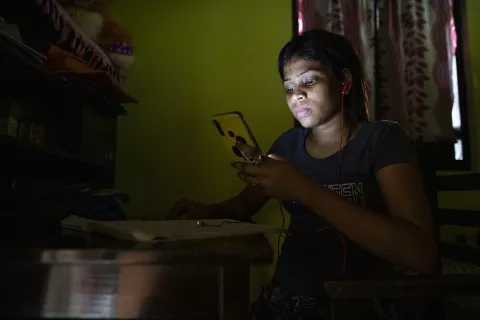How can I tell if a child is depressed during the COVID-19 pandemic?
The COVID-19 pandemic has impacted people's mental health, including and especially children

The COVID-19 pandemic has impacted people's mental health across the world. Spending months on end in lockdown, getting exposed to negative news around the clock and losing near and dear ones has had a worrisome impact on mental health.
Children and parents are among those who are struggling with issues related to mental health. Parents and children with pre-existing mental health conditions are at increased risk of their condition being further impacted due to the pandemic. There have been reports of increased family violence, abuse, and neglect.
Hundreds of children have lost their loved ones during the COVID-19 pandemic, including in some cases either one or both of their parents. Dealing with grief is difficult and even more so for children who might never have been previously exposed to pain and death at such an early age. Many children are either showing signs of depression or are slipping into depression.
Depression is a state where one feels very sad, hopeless, and unimportant, and is often unable to live in a normal way. Often depression is accompanied by anxiety.
Children who are under stress, experience loss, or have attention, learning, behavioural, or anxiety disorders are at a higher risk of depression. Symptoms must last for at least two weeks for a diagnosis of depression.
Can a child get depressed, especially considering the current COVID-19 situation?
People of all ages can develop depression, including children and adolescents. Among children, depression is significantly higher in teenagers than younger children. Adolescence is the transition period from childhood to adulthood marked by emotional instability and rapid physical and social changes, which also create stress. Although depression is more common in adolescence, it can occur in children as young as preschool age.
Children from all age groups, as young as 3-4 years, can get depressed - especially considering the current, difficult situation where children have lost their routine, opportunities to interact with friends and cannot go to school.
For some children who have experienced loss and grief the chances of developing depression are higher.
How do I know if a child is depressed?
Some common symptoms of depression among children include:
- Changes in weight
- Disturbance in sleep patterns
- Unusual and persistent sadness or irritability
- Sudden loss of interest in activities they once enjoyed
- Sluggishness
- Lower self-esteem
- Hopelessness
- Thoughts of or attempts at suicide
Parents must take note of these sudden changes in behaviour among their children. If several of these symptoms are present for at least two weeks, they can suggest depression. If such behaviour persists, parents must immediately act.
How can I help a child who is showing these symptoms?
First and foremost, what is needed is to recognize and acknowledge emotions. Acknowledge that the child can feel sad and can be depressed. An initial conversation regarding a child’s concerns/issues can be established by engaging the child in a conversation recognizing and acknowledging the emotions that the child may be feeling
Understand the child’s context of depression and understand when and in what situation they feel sad. Is it because there has been the loss of a family member? Is it loneliness/ Or are they feeling low/depressed because of their academic performance?
To provide reassurance to the child as often as possible parents can fix regular times to talk to their child for at least five minutes, to reassure them, to enquire how he/she is doing and ask about their feelings and emotions.
It is also suggested that the child be constantly reminded that there is support available and you are always available. encourage the child to come to you whenever they are upset, and reassure them that you will do your best to help and support them.
Ensure that the child is engaged throughout the day and that their day is structured with an exciting routine. The routine needs to have a mix of activities - including fun, leisure, play, learning, daily chores, family time and adequate sleep and rest.
Doing things we enjoy can be used to distract ourselves - for example, drawing, dancing, listening to music, gardening, etc. These activities will serve as a distraction and focus our attention away from the worries and help alleviate the distress. Practice relaxation exercises like deep breathing, and don’t forget to engage children with activities they love.
When should I seek help from a mental health professional?
Symptoms must persist for at least two weeks for a diagnosis of depression to be made. Also, some medical conditions (e.g. thyroid problems, a brain tumour or vitamin deficiency) can mimic the symptoms of depression so it is important to rule out other medical causes before diagnosing depression.
Please be wary of the following and seek support;
If you see there is a major change in sleeping and eating habits.
If the child talks about or tries to run away from home.
If the child engages in substance abuse, seek the immediate help of a mental health professional.
If you notice self-harm or suicidal thoughts and behaviours immediately seek mental health assistance.
In these challenging times, make sure to create an environment of positivity at home to try to make children feel happy and relaxed.
Take care of yourself too - because if you are happy, your family will be happy.
Call CHILDLINE 1098 for assistance.
UNICEF India worked with leading mental health and child protection experts to produce this series of articles for parents on mental health and children.





